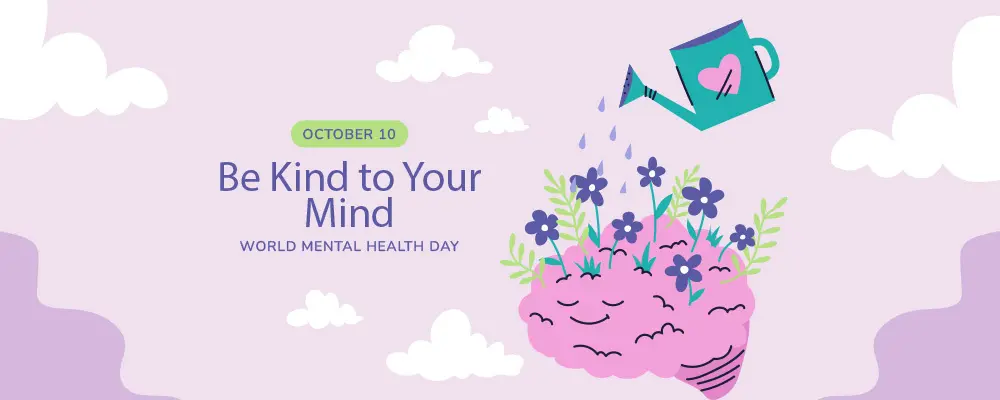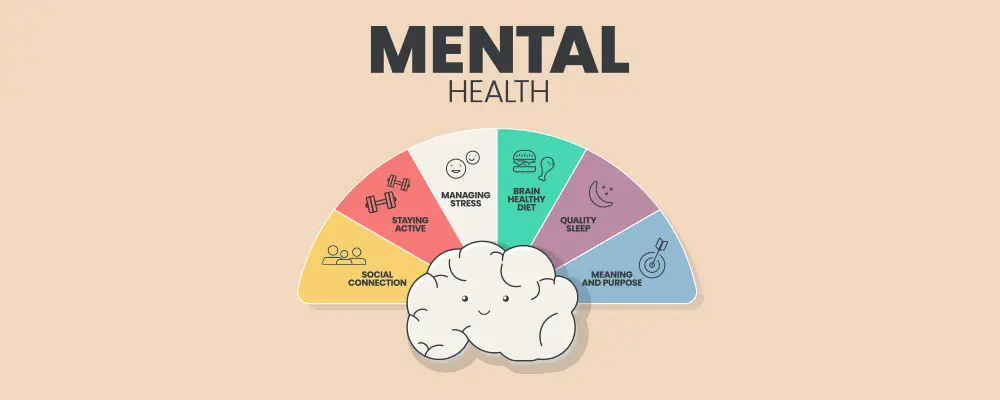World Mental Health Day, observed every year on October 10th, serves as a global platform to promote mental health awareness and emphasize the importance of mental well-being. Mental health is integral to overall health, influencing how we feel, think, and navigate daily life. Yet, mental health challenges often go unnoticed or are met with stigma, preventing individuals from seeking help. With that, workplace organizations also play a critical role in supporting mental health. By promoting mental health awareness and offering mental health resources, organizations can help create a positive work environment where employees feel valued and supported. Simple measures like promoting work-life balance, offering flexible schedules, and providing access to mental health professionals can make a significant difference.
This article emphasizes on the significance of mental health, tips for managing stress, and the importance of creating mentally healthy workplaces, all while underscoring how mental health awareness can improve individual and collective well-being.
What Is Mental Health?
Mental health encompasses emotional, psychological, and social well-being. It affects how we think, feel, and behave, determining how we handle stress, relate to others, and make choices. Maintaining good mental health is essential at every stage of life, from childhood through adulthood.
Mental health issues arise from various factors, including biological predisposition, life experiences, or family history of mental health issues like depression, anxiety, and bipolar disorder These are usually among the most common mental health challenges people face. However, recognizing these issues early and raising mental health awareness can lead to timely interventions and treatment.
A key aspect of mental health awareness is acknowledging that mental health problems are common. According to the World Health Organization (WHO), one in four people will experience a mental health condition at some point in their life. Despite this, there is still a significant stigma around mental health issues, which is why days like World Mental Health Day on 10th October are essential for promoting understanding.
Significance of World Mental Health Day

World Mental Health Day was established by the World Federation for Mental Health in 1992. The primary goal of the day is to increase mental health awareness, educate the public, and advocate for policies that support mental health care access.
The day serves as a reminder that mental health matters just as much as physical health. It encourages individuals, communities, and governments to come together to support those affected by mental health challenges. This day also contributes to reducing the stigma surrounding mental health conditions, allowing individuals to feel comfortable seeking help.
Mental health awareness is crucial in bridging the gap and ensuring that all individuals, regardless of socioeconomic status or location, have access to the mental health care they need.
Tips to Reduce Stress Levels

Stress is a common factor that affects mental health, often leading to conditions like anxiety and depression, if left unchecked. Managing stress is vital for maintaining mental well-being, and there are several strategies individuals can use to cope with stress effectively.
- Mindfulness Meditation: Practicing mindfulness and meditation can help reduce stress by encouraging individuals to focus on the present moment and breathe deeply, calming both the mind and body.
- Physical Activity: Regular exercise releases endorphins, natural mood enhancers, which help combat stress and promote mental well-being. Even a brisk walk or yoga session can make a difference.
- Balanced Diet: Eating a healthy, balanced diet has a direct impact on mental health. Foods rich in nutrients, such as omega-3 fatty acids, antioxidants, and vitamins, support brain function and reduce stress.
- Sleep Hygiene: Getting adequate and restful sleep is essential for stress management. Establishing a regular sleep routine and reducing screen time before bed can significantly improve sleep quality.
- Social Connections: Talking to friends, family, or a therapist can help reduce stress and provide emotional support. Sharing thoughts and feelings with others is an important step in maintaining mental health.
By incorporating these habits into daily life, individuals can better manage stress and improve their overall mental well-being, reinforcing the message of mental health awareness.
Mental Health at Work
Workplaces can significantly impact mental health, either positively or negatively. Long hours, heavy workloads, and lack of support can lead to burnout, anxiety, and depression among employees. However, creating a mentally healthy work environment is important for the well-being of employees and for organizational success as well.
Employers should promote mental health awareness in the workplace by offering resources like mental health days, flexible working hours, and access to counseling services. Encouraging open conversations about mental health and reducing stigma can also foster a more supportive environment where employees feel comfortable seeking help when needed.
Employees suffering from mental health challenges are likely to experience decreased productivity and job satisfaction. By prioritizing mental health, organizations can create a more engaged, motivated, and healthy workforce.
The Global Mental Health Crisis
The world is facing a mental health crisis. The COVID-19 pandemic, economic uncertainty, and social isolation have all contributed to increased rates of mental health conditions worldwide. According to the WHO, depression is now the leading cause of disability globally, and suicide is the second leading cause of death among individuals aged 15-29.
While mental health problems affect people of all ages and backgrounds, there is a disparity in access to mental health care. In many parts of the world, mental health services are limited or inaccessible due to lack of resources, stigma, and inadequate government support. As a result, millions of individuals do not receive the help they need.
World Mental Health Day serves as a call to action to address this crisis. Governments, organizations, and communities must prioritize mental health awareness by allocating funds, training healthcare professionals, and ensuring that mental health services are accessible to everyone.
Takeaway
Taking the time to recognize the importance of mental health puts you miles ahead on the journey to wellness. Understanding how stress, work environments, and societal pressures affect mental health is key to maintaining a healthy balance in life.
On World Mental Health Day, by raising mental health awareness and reducing stigma, we can build a society where individuals feel empowered to seek help when needed and where mental health is treated with the same care and respect as physical health.




